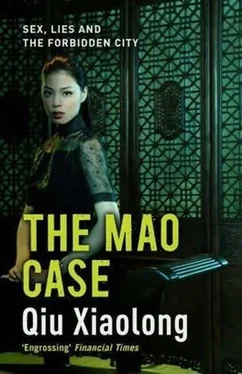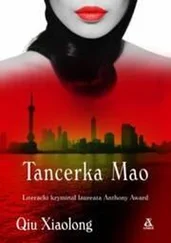“You’re so into the past. The food is not that great, I’ve heard, and the restaurant is expensive. Still, many people want to go there.”
“They want to imagine themselves as President Chiang Kai-shek or Madam Chiang – for an hour or so – over a cup of sparkling wine. Illusion cannot be too expensive.”
“Oh horror!”
“What do you mean, Jiao?”
“Why can’t people be themselves?”
“In Buddhist scripture, everything is appearance, including one’s self,” Chen said, rising. “The restaurant is very close. You can walk there. So I’ll see you this evening.”
Striding out of the premises, he saw a middle-aged man loitering outside the small café, looking stealthily across the street. Possibly an Internal Security man, Chen thought, though he hadn’t seen him before. If so, Internal Security would soon witness him and Jiao sitting together at a candlelight dinner and report back that the romantic chief inspector was making his “approach.”
After all, it was like a couplet in the Dream of the Red Chamber, “When the true is false, the false is true. Where there is nothing, there is everything.”
Jiao saw in Xie’s painting something not only invisible to others but also closely connected to Xie’s life. Chen thought of the book Ling had sent him; in it, critics claimed to have discovered evidence of Eliot’s personal crisis in the manuscript of The Waste Land – his future as a poet uncertain, his marriage on rocks, and his wife a neurotic drag. According to them, the water in the poem could signify what the poet didn’t have in his life, metaphysically as well as physically -
He was struck by an idea – not exactly new, since it had actually crossed his mind the night that he was assigned the Mao Case. That night, in the midst of a confusion of ideas, he had thought of the connection between Li Shangyin’s life and his poetry. That was why he scribbled the word poetry on the matchbox before falling asleep. Only he had forgotten its relevance to the Mao Case by the next morning.
It was the possibility of learning something through Mao’s poetry. Not just as a critic, but as a detective. In spite of all the revolutionary messages in Mao’s poems, some of the lines must have come from his personal experience and impulses, consciously or subconsciously, untold and previously unknown to the public. If Old Hunter could manage to dig out the personal stuff behind Mao’s poem to Kaihui, Chen should be able to do a better job, given his training in literary criticism.
So he really did have some urgent business to take care of, as he had told Jiao, before joining her for dinner. He turned onto a side street, taking a short cut to the subway station, where, in a medium-sized bookstore in the underground mall, he would start searching for all the books about Mao’s poems, like a devoted Maoist.
DETECTIVE YU WOKE EARLY Sunday morning and reached for his wife Peiqin, but she wasn’t in bed beside him. Probably shopping, he guessed. She would usually go to the market early on Sunday morning.
He thought he heard a muffled sound outside the door. The building was old and housed many families – it was likely some residents were already up and moving. He didn’t get up. Reaching for a cigarette, he went over in his mind what he had done for the last few days.
With the Party’s emphasis on “a harmonious society,” the bureau suddenly had a new focus. Several cases were assigned to the special case squad, temporarily under Yu during Chen’s leave. Those cases didn’t seem that special to Yu, but Party Secretary Li saw them in a different light. For instance, the squad was told to keep an eye on a “troublemaking” journalist who tried to expose the officials involved, directly or even indirectly, in a corruption case. Li’s lecture for the job was delivered in the name of “political stability” as a precondition for the “harmonious society,” condemning the journalist’s efforts, which could cause people to lose their faith in the Party. Yu didn’t have his heart in those assignments. Keeping an eye on someone didn’t necessarily mean seeing something, or doing something, as he told himself again, taking a long pull at his cigarette.
His mind wandered off to the unannounced “vacation” for Chief Inspector Chen. It wasn’t the first time Chen had taken such a vacation, but it was the first time he had done so without saying anything about it to Yu. On the contrary, Chen had contacted Yu’s father, Old Hunter, instead.
According to the retired officer, Chen’s decision was utterly understandable. Too much risk was involved. “Some knowledge can really kill, son.”
But Yu felt terribly let down. He should have been told about what kind of an assignment it was. He had worked with Chen on many cases, weathering storms in the same boat. What was more frustrating was that even Old Hunter begrudged him the necessary information, hemming and hawing while trying to enlist him to help. And even that was only because of Yu’s personal connection to Hong, the neighborhood committee cop in charge of the Jiling district. Old Hunter had likely already approached Hong without success. So it was up to Yu to do a background check on someone named Tan who had once lived in the district. In addition, Yu was told to be alert to anything seen or heard at the bureau regarding Internal Security.
Hong had also been an “educated youth” in Yunnan Province and had joined the Shanghai police force around the same time as Yu. They had known each other for more than twenty years. Hong cooperated without asking a single question, but the information he provided only mystified Yu.
In the mid-seventies, Tan, the only son of a capitalist family, tried to sneak across the border to Hong Kong in the company of his girlfriend Qian, also of black family background. They were caught making the attempt. Tan was so badly beaten that he killed himself, leaving a note in which he shouldered all the responsibility, trying to shelter his girlfriend from the consequences of their act. It was an unquestioned suicide, and an understandable one too. For such a “crime,” Tan could have spent his next twenty or thirty years rotting in prison.
Tan’s parents died shortly thereafter. Qian died a couple of years later. A sad story, but how someone who had died twenty years ago could have any bearing on Chen’s assignment today, Yu failed to understand.
He didn’t stop there, though. He went on to look into the background of Peng, another lover of Qian’s. The initial check yielded little. In those years, it was a crime for people to have sex without a marriage license, and Peng was sentenced to five years for his affair with Qian, a woman then ten years his senior. He never recovered. Nor had he had a regular job since his release. If there were anything remarkable at all about Peng, it would be his ability to muddle along all these years.
Yu had no idea how any of this could be helpful to Chen, who could have easily gotten the same information with a couple of phone calls.
In the meantime, Yu had heard nothing concerning the movements of Internal Security, at least not within the bureau. There was something unusual about the quiet. Party Secretary Li’s reticence about Chen’s leave spoke volumes about it. Yu ground out his cigarette, more confused than before, and lonely too.
Then, in spite of himself, he dozed off before putting the ashtray out of sight.
When he opened his eyes again, Peiqin was in the room, half sitting, half squatting on a wooden stool, plucking the feathers from a chicken in a plastic basin full of hot water. A bamboo-covered thermos bottle stood beside. There was also a basket full of vegetables and soybean product on the floor.
Читать дальше












